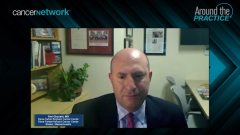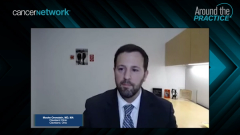
Patient Case 2: A 53-Year-Old Woman With RCC
Dr Choueiri presents the second patient case to the panel: a 53-year-old woman with renal cell carcinoma that underwent a nephrectomy.
Episodes in this series

Toni Choueiri, MD: Let me move to the second case. I think we're doing good in time. I hope our audience here is enjoying this lively discussion. We have representation from everywhere from the great state of Texas as well as Ohio and Massachusetts here. We're not going to talk about sports preference here so that we can all stay the four of us on good terms. But let's move to the second case, which actually is a case about sequence. This is beyond first treatment of RCC [renal cell carcinoma]. This is patient case two; it's a 53-year-old woman with renal cell cancer who underwent right radical nephrectomy in April 2019. This is before COVID [coronavirus], because this is how I'm counting now the years. This is pre-COVID. 13 months later, she developed on scans that were done just routine. She was getting scans every three months, so, she developed bilateral lung metastasis, as well as lymph node metastases; these were biopsied and showed clear cell RCC grade performance status. We drew lab on her, corrected calcium was 12, and the hemoglobin was 9.8.
So, let's look at this polling question. What's the patient risk group? And here, we're going by the IMDC risk factors. Is this patient favorable, intermediate, or poor?
So, assume, if they don't give you lab results, that these were normal.
Dr. Braun, what do you think? The majority of folks, 60%, tend to think that this patient does have intermediate IMDC risk group.
David A. Braun, MD, PhD: I think that's probably right. And I think if we look at the labs, and we sort of add up the points; has an elevated calcium, so that's one point. Has an anemia, so that's two points. The platelets and absolute neutrophil counts were not given, but we'll assume they're normal. I believe that KPS, if I'm remembering right, was greater than 80, and so we're OK on that front. And then they give a very specific time, it was greater than 12 months, from disease diagnosis to needing systemic therapy. And we add up all the points, it's two points, and that puts it in the intermediate category.
Toni Choueiri, MD: Excellent. Next slide, please. So, this patient, Dr. Braun, here, what was your first-line treatment? And despite the second-line case, in order to be second line, you have to go through first-line. What's your first line treatment for this patient? I don't want explanation. I'm going to go one by one. Dr. Zhang?
Tian Zhang, MD, MHS: For this patient, who is more than a year out and metastatic, we're picking amongst all of these agents, and I don't see any contraindications for immunotherapies. So intermediate risk disease, I would pick an immunotherapy based on a combination. And we would talk about goals and what each of these IO-based combinations look like. She certainly fits the criteria for someone I would think about for ipilimumab nivolumab, man, and try to shoot for a complete response. And look, the audience's agreeing with me.
Toni Choueiri, MD: Perfect. Let's see how the audience changed, but your answer is not the correct answer. The correct answer is PDIGREE clinical trial. But let's move to Dr. Orenstein. As a reminder, Dr. Zhang is leading an intergroup, very large trial called the PDIGREE study. I think we're going to go back to that study a bit later, but that's the correct answer. So, Dr. Orenstein, do you agree with nivo-ipi [ipilimumab/nivolumab] here, or you would do a VEGF IO combo?
Moshe Orenstein, MD, MA: No, I agree that definitely, in this patient, doesn't seem to be symptomatic from their disease. It doesn't sound like it's a massive disease burden. I know there are two IMDC risk factors here. But at the same time, I do view patient two has developed metastatic disease more than a year later, a little different from a biology perspective. I don't see things that worry me about the more immediate response like liver mets or bone mets. I'm more inclined in this patient, again, certainly any of the IO-based combinations are fair, but to have a discussion about an IO-IO versus an IO-TKI, and I definitely can see myself leaning towards ipi-nivo [ipilimumab/nivolumab] in this patient.
Toni Choueiri, MD: Dr. Braun, if you agree here with ipi-nivo [ipilimumab/nivolumab], we can move quickly, and folks can start preparing their dinner.
David A. Braun, MD, PhD: I agree with all the wonderful discussions; you have to discuss with the patient, it has to be shared decision, but I would advocate pretty strongly for ipi-nivo [ipilimumab/nivolumab], in this case. In my mind, one of the main benefits is low primary PD rate for IO-TKI combinations. And you can't afford to not get a response. This doesn't seem like this patient. It seems like there's time to try to get a response. And I'd go with a thing for 53-year-old, the thing that's most likely to have durability long term. And, in my mind, that's ipi-nivo [ipilimumab/nivolumab]. I would sort of advocate for that pretty strongly.
This transcript has been edited for clarity.
Newsletter
Stay up to date on recent advances in the multidisciplinary approach to cancer.









































